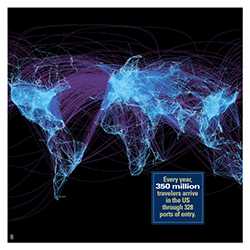NCEZID: Keeping Borders Secure and Travelers Safe
One of CDC’s best-kept secrets is the people in NCEZID who focus on preventing the importation and spread of infectious diseases into the United States. More than a million people travel to the United States each day. Americans stay on the go, too, taking about 74 million trips each year. All international travelers face increased risk of getting and spreading infectious diseases.
What we’re doing:
- NCEZID oversees 20 quarantine stations, strategically located at US airports, land borders, and seaports. Staff at these Q stations, as they are called, work hard to protect the public’s health from threats, both foreign and domestic. The work extends to cover all ports of entry (more than 300) into the United States. Every day NCEZID staff work with Customs and Border Protection and other federal agencies, the airlines and cruise lines, and state and local public health departments to prevent the spread of infectious disease to US communities.
- The Travelers’ Health website provides outbreak updates and travel notices, travel-related disease information, interactive maps, and other destination-specific recommendations for travelers and their healthcare providers.
- NCEZID publishes The Yellow Book (CDC Health Information for International Travel), the definitive US travel medicine reference for clinicians advising patients before and after travel.
- We alert travelers at airports about disease outbreaks and steps they can take to protect themselves.
- NCEZID responds to sick travelers who arrive in the United States at major airports, seaports, or land border crossings.
- For example, when sick passengers are on a flight, the airline lets CDC know. We evaluate whether they might be contagious to others on the plane.
- We restrict the importation of animals and products that may carry disease, such as monkeys, bats, small turtles, cats, and dogs.
- Because we are located at airports, we can send life-saving drugs on the next flight to save the life of someone with malaria, botulism, or diphtheria. These drugs are difficult to obtain commercially, but we make them available to US clinicians for patients who meet certain requirements.
Every year, 350 million travelers arrive in the US through 328 ports of entry.
- Page last reviewed: August 28, 2017
- Page last updated: August 28, 2017
- Content source:
Centers for Disease Control and Prevention
National Center for Emerging and Zoonotic Infectious Diseases (NCEZID)


 ShareCompartir
ShareCompartir
